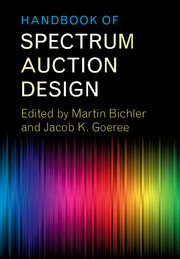Book contents
- Frontmatter
- Contents
- List of Contributors
- Preface
- List of Papers
- Part I The Simultaneous Multiple-Round Auction
- Part II The Combinatorial Clock Auction Designs
- Part III Alternative Auction Designs
- 18 A Combinatorial Auction Mechanism for Airport Time Slot Allocation
- 19 A New and Improved Design for Multi-Object Iterative Auctions
- 20 Hierarchical Package Bidding: A Paper & Pencil Combinatorial Auction
- 21 Assignment Messages and Exchanges
- 22 The Product-Mix Auction: A New Auction Design for Differentiated Goods
- 23 The Continuous Combinatorial Auction Architecture
- 24 Coalition-based Pricing in Ascending Combinatorial Auctions
- Part IV Experimental Comparisons of Auction Designs
- Part V The Bidders’ Perspective
- Part VI Secondary Markets and Exchanges
- Outlook
- References
24 - Coalition-based Pricing in Ascending Combinatorial Auctions
from Part III - Alternative Auction Designs
Published online by Cambridge University Press: 26 October 2017
- Frontmatter
- Contents
- List of Contributors
- Preface
- List of Papers
- Part I The Simultaneous Multiple-Round Auction
- Part II The Combinatorial Clock Auction Designs
- Part III Alternative Auction Designs
- 18 A Combinatorial Auction Mechanism for Airport Time Slot Allocation
- 19 A New and Improved Design for Multi-Object Iterative Auctions
- 20 Hierarchical Package Bidding: A Paper & Pencil Combinatorial Auction
- 21 Assignment Messages and Exchanges
- 22 The Product-Mix Auction: A New Auction Design for Differentiated Goods
- 23 The Continuous Combinatorial Auction Architecture
- 24 Coalition-based Pricing in Ascending Combinatorial Auctions
- Part IV Experimental Comparisons of Auction Designs
- Part V The Bidders’ Perspective
- Part VI Secondary Markets and Exchanges
- Outlook
- References
Summary
Introduction
Due to the advances in modern computing and communication capabilities which allow to adopt advanced auction mechanisms in increasingly broader and larger-scale online settings, the theory on how multiple indivisible objects should be allocated via an auction has enjoyed renewed interest in recent years (Krishna 2002, Cramton et al. 2006, Bichler et al. 2010). One of the key goals in this research literature is to develop mechanisms that achieve high (allocative) efficiency. Allocative efficiency measures whether auctioned objects end up with the bidders who have the highest valuations for them, representing a measure of social welfare.
In this paper we aim to design highly efficient ascending combinatorial auctions. Among the problems that make this goal hard to achieve, the coordination of bidders is a key problem that has been largely underexplored in prior work. Specifically, the currently losing bidders have a task of identifying individually profitable and collectively complementary item bundles to bid on from an exponentially-sized set of all possible bundles (and determining appropriate bid prices for them), which together stand a chance of becoming a winning bid set in the next round. Identifying such bundle bids is possible either via a large number of auction rounds or by means of a highly non-trivial coordination among coalitions of losing bidders, which is difficult without appropriate price feedback. We address this challenge by proposing a coalitional pricing rule, which is able to draw on the data that the auctioneer collects about bidders’ preferences throughout the auction and, as a result, helps currently losing bidders to coordinate. The proposed combinatorial auction mechanism exhibits substantially improved convergence and increased efficiency in lab experiments.
The Need for Ascending Combinatorial Auctions
Combinatorial auctions are among the most general types of multi-object market mechanisms, as they allow selling (or buying) a set of heterogeneous items to (or from) multiple bidders.
Information
- Type
- Chapter
- Information
- Handbook of Spectrum Auction Design , pp. 493 - 528Publisher: Cambridge University PressPrint publication year: 2017
